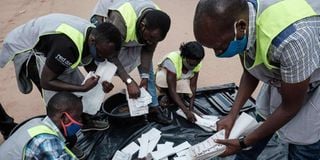Premium
Uganda electoral commission warns against parallel vote tallying

Electoral commission officials start to count ballot papers for the presidential election at a polling centre in Kampala, Uganda, on January 14, 2021.
What you need to know:
- Ugandans went to elections Thursday to vote in the Presidential election in which Yoweri Museveni is seeking to extend his long tenure.
- Ten candidates are in the race in an election that was overshadowed by claims of rigging, internet disruption and brazen display of military might.
Uganda electoral commission chairman Simon Byabakama has said the declaration of the final results of the Presidential election is an exclusive domain of the commission and warned those planning to run a parallel tallying system against doing so.
Citing the Presidential election law, Mr Byabakama said no other person is authorized to make such a declaration, but fell short of explaining the consequences of such an action.
“I want to caution that the no person is authorized to declare the outcome of the presidential election other than the commission,” Mr Byabakama said when he presided over the official opening of the national tallying centre in Kampala soon after the polling stations were closed.
Mr Byabakama appeared to have been responding to calls by opposition presidential candidate Robert Kyagulanyi aka Bobi Wine, who had urged his supporters not to leave the polling stations after casting their ballots.
Bobi Wine had also asked his supporters to use their phones and collect any kind of evidence that will enable the opposition successful challenge the outcome of the vote should they lose to longtime leader Yoweri Museveni.
“I urge stakeholders to desist from pursuing such a path,” Byabakama said, he warned without elaborating.
“Let the candidates keep calm and tolerant. It is our hope those present at counting halls are peaceful and orderly.”
Ugandans went to elections Thursday to vote in the Presidential election in which Mr Museveni who seized power in 1986 is seeking to extend his stay at the top for further five years.
A total of 10 candidates, including Mr Museveni, are in the race for an election that was overshadowed by claims of rigging, internet disruption and brazen display of military might by the Museveni regime.
Mr Byabakama said that voting in the Presidential race had taken place in all the 34, 683 polling stations across the country and hailed the people of Uganda for the peaceful conduct during the exercise.
Peaceful election
“It has generally been a peaceful election and I salute all the people of Uganda for coming out in large numbers to vote in a peaceful and tranquil manner,” he said.
With the shutdown of the internet some Biometric Voter Identification kits failed in some polling stations but he clarified that the problem had been attended to by the commission’s technical staff and the exercise went on smoothly.
According the Ugandan Presidential election law, the votes are counted at the polling stations declarations made by the Presiding Officer.
After counting, the officer will place the ballots into a temper proof envelope and transport them physically to the sub county headquarter which is the central collection point of all presidential ballot papers in a sub county.
The ballots will then be transported to the District headquarters where the District Returning Officer (DRO) will receive sealed ballots, break the seal and tally votes received by each candidate in the polling stations and publicly declare the results.
The law also requires votes received by each candidate be displayed on the screen at the District tallying centre.
The DRO will then relay the results to the national tallying centre electronically.
The national tallying centre will in turn receive all the results, ascertain their validity, publish on the screen and declare the results.
The outcome is to be announced within 48 hours from Thursday 4pm when the polling stations were closed.





